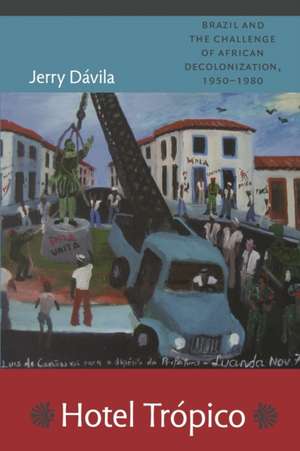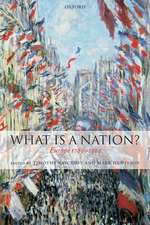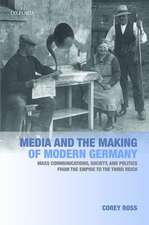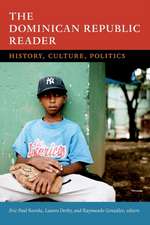Hotel Trópico – Brazil and the Challenge of African Decolonization, 1950–1980
Autor Jerry Dávilaen Limba Engleză Paperback – 2 aug 2010
Preț: 264.26 lei
Nou
Puncte Express: 396
Preț estimativ în valută:
50.57€ • 54.07$ • 42.16£
50.57€ • 54.07$ • 42.16£
Carte tipărită la comandă
Livrare economică 18 aprilie-02 mai
Preluare comenzi: 021 569.72.76
Specificații
ISBN-13: 9780822348559
ISBN-10: 0822348551
Pagini: 328
Ilustrații: 23 illustrations
Dimensiuni: 156 x 225 x 24 mm
Greutate: 0.45 kg
Editura: MD – Duke University Press
ISBN-10: 0822348551
Pagini: 328
Ilustrații: 23 illustrations
Dimensiuni: 156 x 225 x 24 mm
Greutate: 0.45 kg
Editura: MD – Duke University Press
Cuprins
List of Illustrations; AcknowledgmentsIntroduction; 1. Brazil in the Lusotropical World; 2. Africa and the Independent Foreign Policy; 3. The Lovers of the African Race: Brazilian Diplomats in Nigeria; 4. War in Angola, Crisis in Brazil; 5. Latinité or Fraternité? Senegal, Portugal and the Brazilian Military Regime; 6. Gibson Barbozas Trip: Brazil [Re]discovers Africa; 7. Brazil and the Portuguese Revolution; 8. Brazils Special Representation in Angola, 1975; 9. Miracle for Sale: Marketing Brazil in Nigeria; EpilogueNotes; Bibliography; Index
Recenzii
Jerry Dávila has transformed the history of Brazils diplomatic initiatives in Africa during the era of decolonization, adding not only depth and fascinating detail to this story, but also showing how the pursuit of a special Brazil-Africa relationship both drew upon Brazils claims to be a racially democratic nation, and laid bare the contradictions in those claims.--Barbara Weinstein, author of For Social Peace in Brazil: Industrialists and the Remaking of the Working Class in São Paulo, 19201964Hotel Trópico is a superb book. It takes on broad themes such as race and imperialism, modifies much of the current knowledge about Brazils dictatorship, and suggests a re-evaluation of that form of government in Argentina, Chile, and Uruguay. Hotel Trópico will be read not only by scholars of Brazil and Latin America but also by those studying Africa, empire, and post-colonialism. --Jeffrey Lesser, author of A Discontented Diaspora: Japanese Brazilians and the Meanings of Ethnic Militancy, 19601980
"Jerry Davila has transformed the history of Brazil's diplomatic initiatives in Africa during the era of decolonization, adding not only depth and fascinating detail to this story, but also showing how the pursuit of a special Brazil-Africa relationship both drew upon Brazil's claims to be a 'racially democratic' nation, and laid bare the contradictions in those claims."--Barbara Weinstein, author of For Social Peace in Brazil: Industrialists and the Remaking of the Working Class in Sao Paulo, 1920-1964 "Hotel Tropico is a superb book. It takes on broad themes such as race and imperialism, modifies much of the current knowledge about Brazil's dictatorship, and suggests a re-evaluation of that form of government in Argentina, Chile, and Uruguay. Hotel Tropico will be read not only by scholars of Brazil and Latin America but also by those studying Africa, empire, and post-colonialism." --Jeffrey Lesser, author of A Discontented Diaspora: Japanese Brazilians and the Meanings of Ethnic Militancy, 1960-1980
"Jerry Davila has transformed the history of Brazil's diplomatic initiatives in Africa during the era of decolonization, adding not only depth and fascinating detail to this story, but also showing how the pursuit of a special Brazil-Africa relationship both drew upon Brazil's claims to be a 'racially democratic' nation, and laid bare the contradictions in those claims."--Barbara Weinstein, author of For Social Peace in Brazil: Industrialists and the Remaking of the Working Class in Sao Paulo, 1920-1964 "Hotel Tropico is a superb book. It takes on broad themes such as race and imperialism, modifies much of the current knowledge about Brazil's dictatorship, and suggests a re-evaluation of that form of government in Argentina, Chile, and Uruguay. Hotel Tropico will be read not only by scholars of Brazil and Latin America but also by those studying Africa, empire, and post-colonialism." --Jeffrey Lesser, author of A Discontented Diaspora: Japanese Brazilians and the Meanings of Ethnic Militancy, 1960-1980
Notă biografică
Jerry Dávila
Textul de pe ultima copertă
""Hotel Tropico" is a superb book. It takes on broad themes such as race and imperialism, modifies much of the current knowledge about Brazil's dictatorship, and suggests a reevaluation of that form of government in Argentina, Chile, and Uruguay. "Hotel Tropico" will be read not only by scholars of Brazil and Latin America but also by those studying Africa, empire, and postcolonialism."--Jeffrey Lesser, author of "A Discontented Diaspora: Japanese Brazilians and the Meanings of Ethnic Militancy, 1960-1980"
Descriere
The attempts by Brazilian diplomats and intellectuals to establish ties with Africa during and after decolonization reveal the contradictions in Brazils idea of itself as a racial democracy











